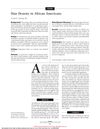 418 citations,
September 2012 in “Nature”
418 citations,
September 2012 in “Nature” African spiny mice can regenerate skin, hair, and cartilage, but not muscle, and their unique abilities could be useful for regenerative medicine.
 129 citations,
June 1999 in “Archives of Dermatology”
129 citations,
June 1999 in “Archives of Dermatology” African Americans have less hair density than whites.
55 citations,
March 2007 in “Journal of cosmetic dermatology” Afro-ethnic hair can be straightened using chemical and heat methods.
 25 citations,
August 2015 in “Journal of cosmetic dermatology”
25 citations,
August 2015 in “Journal of cosmetic dermatology” African American women report more hair issues and use different hair care practices than Caucasian women, and have different hair and scalp characteristics.
 23 citations,
January 2014 in “International Journal of Biological Sciences”
23 citations,
January 2014 in “International Journal of Biological Sciences” African American men with prostate cancer have more androgen receptor mutations, which may lead to more aggressive cancer compared to Caucasian American men.
19 citations,
September 2005 in “International Journal of Dermatology” African-American hair's curl pattern significantly affects its strength and elasticity.
17 citations,
September 2005 in “International Journal of Dermatology” African hair is more fragile due to its unique shape and internal structure.
 16 citations,
June 2019 in “International Journal of Women's Dermatology”
16 citations,
June 2019 in “International Journal of Women's Dermatology” Type 2 diabetes may increase the risk of severe hair loss in African American women.
11 citations,
May 2011 in “Veterinary Record” A dog in France died from an African parasite infection after traveling from Senegal.
 6 citations,
March 1999 in “Journal of pediatric health care”
6 citations,
March 1999 in “Journal of pediatric health care” The document emphasizes the need for primary care providers to understand and care for African American children's hair and skin to boost their self-esteem.
 5 citations,
February 2020 in “European Food Research and Technology”
5 citations,
February 2020 in “European Food Research and Technology” African baobab fruit is a good source of antioxidants and micronutrients, but too much can cause laxative effects.
4 citations,
January 2022 in “Cosmetics” Avoid high-tension styles and use professional treatments to reduce hair damage and health risks.
4 citations,
February 2019 in “American Journal of Human Biology” Collecting hair from all scalp sections works as well as the standard method for cortisol analysis.
 2 citations,
December 2020 in “Phytomedicine plus”
2 citations,
December 2020 in “Phytomedicine plus” Taking Saw palmetto and Pygeum africana can change the levels of certain steroids in urine, which could cause confusion in doping tests.
2 citations,
December 2016 in “Springer eBooks” Dermatologists need to understand diverse cultural hair practices to offer better care.
 2 citations,
April 2016 in “Más dermatología”
2 citations,
April 2016 in “Más dermatología” The supplement with Serenoa repens and Pygeum africanum significantly increased active hair growth and decreased rest phase hair in post-menopausal women with hair loss, with only mild digestive side effects.

Afro-textured hair is more fragile and prone to certain scalp conditions, requiring careful treatment and more research for effective management.
1 citations,
February 2024 in “Diversity” African plants can treat hair issues and may help with diabetes.
 February 2024 in “International Journal of Dermatology”
February 2024 in “International Journal of Dermatology” The document concludes that more local research on African skin and hair is needed despite increased scientific output from Sub-Saharan Africa.
 September 2024 in “Journal of the American Academy of Dermatology”
September 2024 in “Journal of the American Academy of Dermatology” The supplements improved hair density and reduced hair loss.
 July 2024 in “Skin Appendage Disorders”
July 2024 in “Skin Appendage Disorders” The supplement significantly improves hair density and appearance in people with hair loss.
 April 2022 in “Journal of applied science and environmental management”
April 2022 in “Journal of applied science and environmental management” Alligator pepper seed extract improved wound healing in rats.
June 2008 in “Springer eBooks” 239 citations,
September 1996 in “The journal of alternative and complementary medicine/Journal of alternative and complementary medicine” Traditional African medicinal plants should be scientifically tested and integrated into modern healthcare.
 76 citations,
November 2010 in “Journal of The American Academy of Dermatology”
76 citations,
November 2010 in “Journal of The American Academy of Dermatology” Some African American women's central scalp hair loss is linked to genetics and past fungal scalp infections, with more research needed on other causes.
 8 citations,
March 2014 in “Dermatologic Clinics”
8 citations,
March 2014 in “Dermatologic Clinics” Specialized techniques are needed for hair restoration in individuals with curly Afrocentric hair due to unique challenges.
 5 citations,
September 2021 in “Southern African Journal of Hiv Medicine”
5 citations,
September 2021 in “Southern African Journal of Hiv Medicine” The guideline provides healthcare professionals in South Africa with instructions for comprehensive, multidisciplinary gender-affirming care, including HIV prevention and treatment for transgender and gender diverse individuals.
 5 citations,
June 2019 in “Open Forum Infectious Diseases”
5 citations,
June 2019 in “Open Forum Infectious Diseases” Six African American women experienced hair loss after switching to a new HIV medication.

Wild African goats have genetic adaptations for surviving harsh desert conditions.
 January 2012 in “Yearbook of Dermatology and Dermatologic Surgery”
January 2012 in “Yearbook of Dermatology and Dermatologic Surgery” Some African American women experience central scalp hair loss, often linked to a history of fungal scalp infection.




















